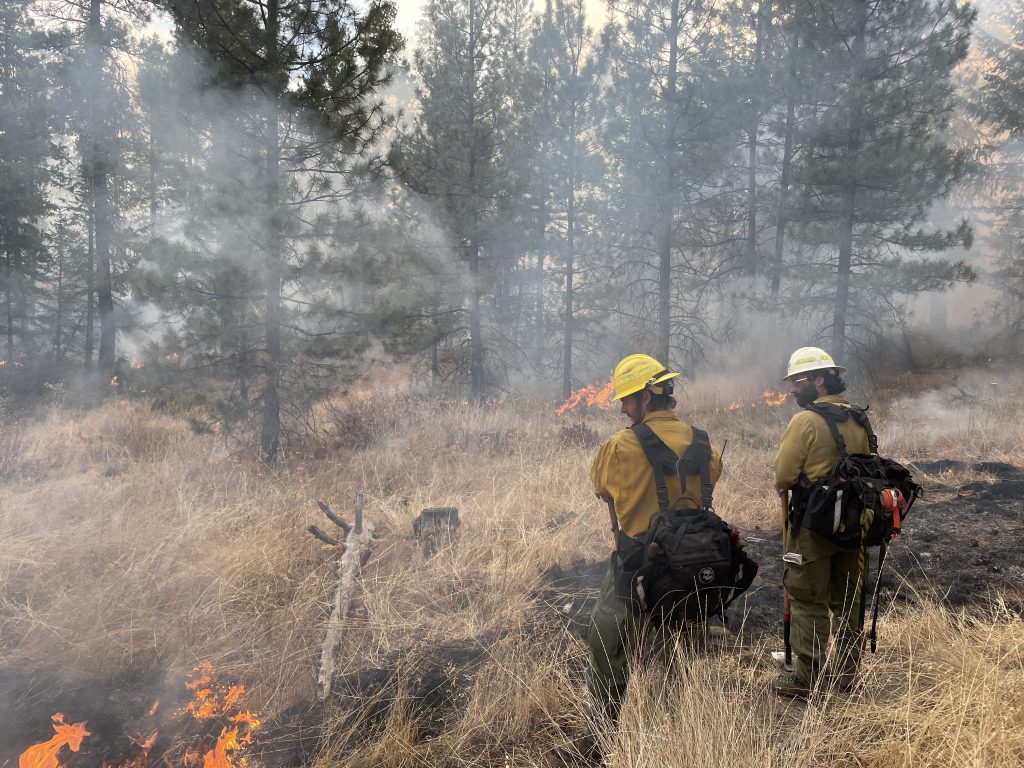Podcast: Play in new window | Download | Embed
The Washington State Department of Natural Resources (WADNR) is reaching out to tribes to offer firefighting training to tribal members.
Spokane Public Radio’s Steve Jackson reports.
In recent years, major wildfires have raged on Native American reservations in Washington, notably on the Colville on the east side and the Quinalt on the west.
While some tribes have a number of trained firefighters, many others need that kind of expertise.
A new initiative will use $800.000 in state money to offer training at various levels of firefighting experience, from basic levels to that of a fire boss.
Angie Lane of DNR’s wildland fire management division says the funding will help pay for than just the courses themselves.
“You know having a scholarship that pays their way of you will, like their travel, their time away from home, tuition, whatever else might be involved, that’s wrapped up in that scholarship.”
DNR is also partnering with WSU Extension Service to introduce tribal members to fire suppression and prescribed fires as fire management techniques.
In-person courses will begin in the spring, but online courses will be offered this fall.
Interested people can contact the Washington Department of Natural Resources.

Bears Ears National Monument Sign approaching from Blanding, Utah. The monument is co-managed by the Bureau of Land Management, U.S. Forest Service, and Bears Ears Commission. (Photo: Cindy Gallo / BLM)
The Bureau of Land Management and US Forest Service have released their final plan for managing Bears Ears National Monument in southeast Utah.
It’s the culmination of years of collaboration between the agencies and tribes.
KUER’s David Condos reports for the Mountain West News Bureau.
The proposed plan is based on one of the five alternatives the agencies released this spring during the public comment period. It would allow camping, but ban recreational shooting – and it requires permits to access certain areas like Arch Canyon and Moonhouse.
It also slightly reduces the land open to livestock grazing and it leaves more than 1,000 miles of roads open to off highway vehicle (OHV) use, but requires OHVs to stay on designated routes.
Overall, the plan leaves a majority of the monument as undeveloped wilderness areas.
Now, there’s a 30-day protest period where anyone who previously submitted public comment can raise their issues again if they felt they weren’t addressed.

(Courtesy Facebook / Idaho Legislature)
The Nez Perce Tribe in Idaho released a statement Monday regarding an incident at a recent candidate forum.
State Rep. Dan Foreman (R-ID) reportedly told Democratic candidate Trish Carter-Goodheart (Nez Perce) to “go back where you came from.”
In the statement, the Nez Perce Tribe said it is extremely disheartened to hear about the incident, and that the Nez Perce Tribe has called this area home for tens of thousands of years.
The statement goes on to talk about the history of the region.
The tribe says it refuses to tolerate this kind of hateful and divisive politics and asks other elected leaders in the region to stand with the tribe and push back against such offensive behavior.
Rep. Foreman’s comments reportedly happened as Carter-Goodheart talked about racism and discrimination in the state.
The Lewiston Tribune reports Foremen has not responded to requests about the comments, but stated on Facebook that he made no racial slur or statement of any nature, and that the accusations are false.
The Federal Emergency Management Agency (FEMA) has announced federal disaster assistance has been made available for the San Carlos Apache Tribe in Arizona, to help with recovery efforts from the Watch Fire.
The fire devastated the community in July.
The assistance includes grants for temporary housing and home repairs, low-cost loans to cover uninsured property losses, and other programs to help individuals and business owners recover from the fire.
Get National Native News delivered to your inbox daily and stay up-to-date on the 2024 Native Vote. Sign up for our daily newsletter today.



